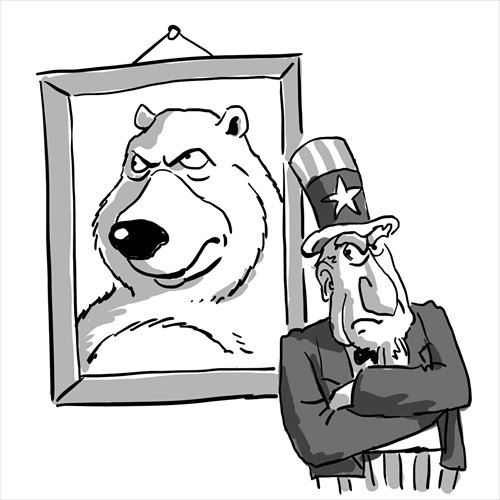
Illustration: Liu Rui/GT
The crisis in Ukraine has implications for Europe and beyond. Before the situation gets out of hand, it must be settled equitably through diplomatic and political means.
A Western confrontation with Russia over Ukraine serves no useful purpose, and can only lead to revival of Cold War tensions. China's New Silk Road concept, which extends into Eastern Europe, can be undermined by Western-provoked instability in the region.
Should major power cooperation with Russia be set back by Washington's improper interference in Ukraine, it will inevitably become difficult to find diplomatic solutions to pressing Middle East issues.
The situation in Ukraine is complicated. The East-West cultural and political split inside Ukraine turns on matters of ethnicity, language, and religion.
The split has yet to be resolved into a broader Ukrainian identity, and so the country is subject to manipulation by internal and external forces.
Some experts say that in a worst case scenario, the present crisis in Ukraine could result in civil war. Should civil war break out, Western and Russian military intervention is possible.
Partition is another scenario. The question is whether partition could be peaceful as in the case of the former Czechoslovakia.
A third scenario involves substantial compromise that would update the present constitution to allow for more autonomy in the regions within a new federal structure.
In this way, tensions could be diffused by allowing the eastern region more economic linkages with Russia and by allowing the western region to have more economic linkages with the EU.
The EU so far has refrained from economic sanctions against Ukraine in spite of pressure from Washington. But any scheme to turn Ukraine into a deindustrialized vassal state is a nonstarter.
Whatever formulas are chosen for resolution of the current crisis, it is fundamental that Ukrainians themselves work out their own destiny. Neo-Nazi extremism must be suppressed.
There are broader international implications. The present crisis could lead to a serious US confrontation with Russia, which would mean that major power cooperation in other parts of the world would be called into question.
US and Russian cooperation in the Middle East on Syria and Iran could well be set back. This in turn could lead to heightened regional tensions and lead to the possibility of regional war.
Western media reported the vulgar remarks concerning the EU by Victoria Nuland, who is US assistant secretary of state for European and Eurasian affairs.
The media refrained from reporting that Nuland is the wife of Robert Kagan who is a key leader of the pro-Zionist neoconservative policy network.
It is well known that the staunchly pro-Israel neoconservatives express deep political and cultural aversion to Russia, and promote Cold War perspectives. Such a mindset undermines US global diplomacy and US national interests. Thus Ms Nuland is the wrong person for a high US diplomatic position, critics say.
Using the Ukraine crisis to subvert major power relations between the US and Russia and their constructive joint action in the Middle East serves Israeli interests. It helps Israel and its neoconservative allies in the US and in Europe push for unilateral US military action against Syria and Iran.
So far, the Obama administration has failed to correctly "reset" relations with Russia. The White House two years ago unwisely sent an inexperienced and unwelcome academic to Moscow as ambassador. His recent resignation must result in the US sending an experienced professional diplomat to this critical post.
Many critics say that President Barack Obama has no positive legacy on domestic issues, which indeed are a self-evident mess. They say his only hope for a favorable legacy lies in foreign policy success.
But if Obama is to have any foreign policy success, he must get relations with major powers right. In an increasingly multipolar world, Washington is not in a position to impose its will unilaterally.
Washington must engage in constructive diplomatic dialogue with Russia rather than confront Russia over the dangerous Ukraine crisis.
The author is an educator and former senior professional staff member of the Senate Committee on Foreign Relations. opinion@globaltimes.com.cn



